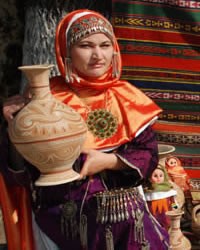Lak in Russia

Photo Source:
The Action - Wikimedia
Creative Commons
|
Send Joshua Project a map of this people group.
|
| People Name: | Lak |
| Country: | Russia |
| 10/40 Window: | No |
| Population: | 173,000 |
| World Population: | 188,700 |
| Primary Language: | Lak |
| Primary Religion: | Islam |
| Christian Adherents: | 0.00 % |
| Evangelicals: | 0.00 % |
| Scripture: | Portions |
| Ministry Resources: | Yes |
| Jesus Film: | Yes |
| Audio Recordings: | No |
| People Cluster: | Caucasus |
| Affinity Bloc: | Eurasian Peoples |
| Progress Level: |
|
Introduction
The traditional occupations of the Lak are agriculture and animal husbandry. From their homeland in western Russia (Dagestan) the Lak grow and harvest wheat, olives, grapes, maize and vegetables in the lands that surround their villages. Starting in the 1990s, some of the urban Lak started coming to Jesus, and now there are a handful of Lak believers. The New Testament books of Mark and Luke were translated. After that, Bible work stalled because of a lack of team leadership. Outreach to the Lak must include furthering this translation project so they can have the Bible in their mother tongue.
Ministry Obstacles
Dagestan is extremely difficult for Christian workers to enter, and there is much resistance to the advance of the gospel in this area.
Outreach Ideas
Pray for the Followers of Christ
Pray for the Entire People Group
There are very few believers among the Lak. Pray for the Lord to give them strength and courage to share the gospel with their Muslim neighbors.
Pray for the few Lak believers to shine as bright lights in the midst of their families and clans.
Pray for encouragement and success for a Lak Bible translation team.
Ask the Lord to send loving workers to the Lak.
Pray that the Lord would raise up a growing church movement among the Lak of Dagestan.